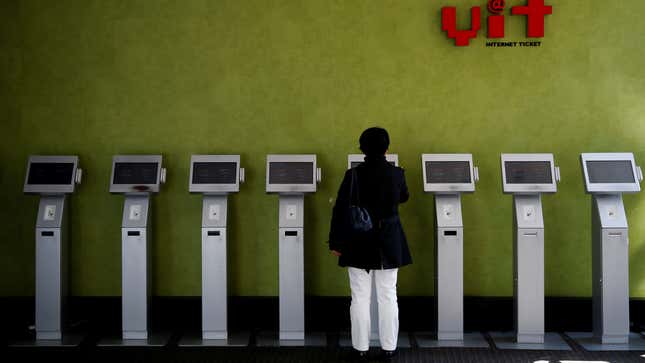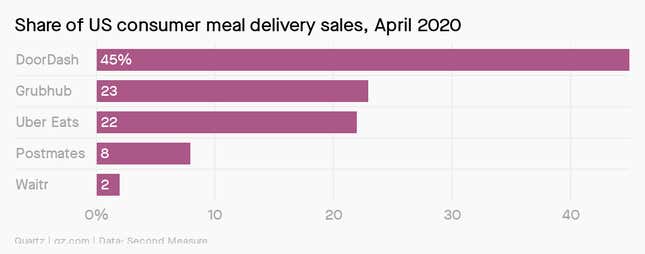Good morning, Quartz readers!
Here’s what you need to know
The WHO called for “exhaustive investigation” of new coronavirus clusters… The health agency’s call came in response to a new cluster of 79 cases in Beijing. Tokyo reported its own cluster of 47 new cases. US stocks plummeted on pandemic fears before rebounding after the US Federal Reserve vowed to buy corporate debt.
…and China’s not accepting European salmon. The state-run media announced that coronavirus had been found on cutting boards used to chop fish imported from Europe at Beijing’s Xinfadi market. The strain found lately in Beijing is reported to have been genetically linked to Europe, though the connection could be due simply to the global spread of the disease.
The US Supreme Court ruled against LGBTQ discrimination. In a surprise decision, the court decided that “an employer who fires an individual merely for being gay or transgender defies the law.” Before Monday, this form of discrimination was legal in most US states.
American companies got permission to work with Huawei to set 5G standards. The US Commerce Department told Reuters that it would allow firms to participate in laying the rules for the next generation of communications infrastructure in order to “not cede leadership in global innovation.”
The British government took a swipe at HSBC. In response to the company’s decision to back China’s national security law, UK foreign secretary Dominic Raab said the government “will not sacrifice the people of Hong Kong over the altar of banker bonuses.”
Slowing the red carpet’s roll

The Academy of Motion Picture Arts and Sciences—the folks who bring A-list celebrities together every year to show off the latest in formalwear and make tearful speeches—announced that they will be postponing the 2021 Oscars by two months, along with the eligibility deadline for feature films.
Hollywood will be eyeing the rest of the world for clues as to how to get back on track. Despite being a (relative) success story in rebounding from the Covid-19 pandemic, Japan’s box office has been extremely slow to follow suit, providing a glimpse of what bigger film markets like the US and India can expect as they reopen theaters with social distancing policies in place.
In countries where the situation is much worse, moviegoers will have to be re-trained to return to the movies—a process that could be measured in years, not months.
Charting the food delivery sector
On June 10, Grubhub cut Uber out of a potential deal and agreed to merge with Just Eat Takeaway, a European food delivery service, in an all-stock purchase valued at $7.3 billion. Despite enormous industry growth even before the onset of the pandemic and its resulting lockdowns, the meal delivery business remains unstable. In the first quarter of 2020, Uber Eats recorded a $313 million loss in adjusted EBITDA.

It’s not exactly a heartening sign if your food delivery service is struggling during a time of unprecedented demand. When restaurants come back, the demand for Uber Eats and its competitors is likely to decline. With the food delivery industry increasingly saturated with unprofitable players, investors are hungry for more consolidation.
For Members: So you want to test a vaccine…
No problem! There’s just the small matter of redirecting all of your funds and energy. Here’s what you’d need to do to produce a mass vaccine trial at warp speed:
- Drop all other work
- Rustle up some in-house catering
- Pivot your research and restructure your entire organization
- Launch a massive phase one trial of human participants (which typically involves a few dozen participants, but in this case should include up to 1,050)
- Almost immediately start a combined phrase two and three trial with more than 6,000 participants
- Support coronavirus trial sites in North America, Africa, and Asia, as well as in the UK
Your heroic efforts will make a great movie one day. Read more about how organizations like the Jenner Institute have taken on the Herculean task of fighting the novel coronavirus in our field guide on science’s great pandemic pivot.
✦ To gain access to all the stories, presentations, field guides, workshops, and more available exclusively to Quartz members, try a seven-day free trial. ✦
You asked about vaccine access
How will countries pay for vaccines? Will richer countries be prioritized?
Let’s talk about an advance market commitment, or AMC—essentially a fundraising pledge that gives contributors a share of the finished product. Katherine Ellen Foley wrote about Gavi, the Vaccine Alliance’s Covid-19 AMC, which has gotten pledges from the nation of Bhutan, the nonprofit group Gamers Without Borders, and TikTok. Gavi’s no stranger to vaccine AMCs, but this one’s drawn interest from a much more eclectic bunch.
“Why is something like an AMC necessary? It has to do with the way drug companies price vaccines,” Foley writes. “Drug prices are usually set to allow pharma companies to turn a profit after investing in research and development. But vaccines are different: In general, drug companies price vaccines based on what governments will pay for them. Predictably, this translates to wealthier countries paying more for vaccines, and poorer countries paying less. And unless something like an AMC puts an order in ahead of time, that means lower-paying countries can end up at the back of the queue.”
Production bottlenecks and direct contracts between governments and private vaccine producers all tend to jack up prices. Without AMCs and other mechanisms in place, poorer countries may be left without vaccines for their residents even after they’re on the market for the rest of the world.
Surprising discoveries
It’s a great time to sell RVs or turmeric milk… Cooped up Americans and health conscious Indians have helped each product boom during the pandemic.
…or to buy Isaac Newton’s recipe for toad vomit lozenges… An auction house is selling two handwritten pages containing the formula, which was meant to treat the plague.
…or to pay a psychic to sketch your soulmate. As many TikTokers have discovered, there’s an artist on Etsy who will give you a glimpse of your true love for about $30.
Hummingbirds can see extra colors. The birds have more color-sensing cones than we do, allowing them to discern UV-red, UV-green, and possibly the envy-green of cone-deficient humans.
A Taiwanese airport is offering the chance to relive airport security lines. 90 lucky(?) travelers will go through security and immigration, sit on a grounded plane, then wait in the customs line and go home.
Our best wishes for a productive day. Please send any news, comments, queasy amphibians, and psychic sketches to hi@qz.com. Get the most out of Quartz by downloading our app on iOS or Android and becoming a member. Today’s Daily Brief was brought to you by Katherine Ellen Foley, Adam Epstein, Michelle Cheng, Jackie Bischof, Susan Howson, and Nicolás Rivero.